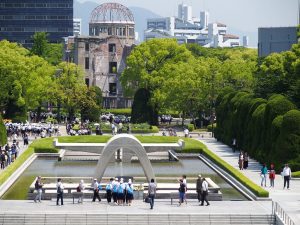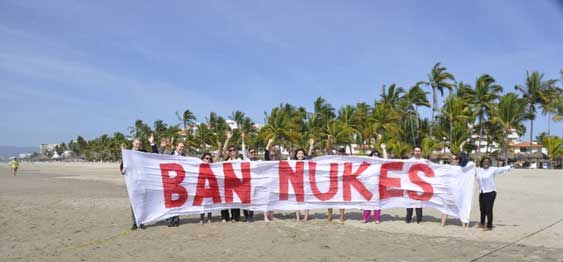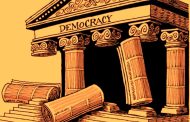Since 1945, no other country has used the nuclear weapons. One explanation for this is that the elephantine nature of the destruction is such that no leader wants to be seen as so cold minded as to ask his or her military chiefs to press the button. So, when Trump came along threatening nuclear devastation of North Korea and Iran, he remained a nightmare president throughout his tenure because, as they say, speaking is governing or, saying is doing. This piece by the editor of the UN Bureau chief of the Inter-Press Service News Agency, Thalif Deen, takes the matter higher by asking whether we can all go to sleep now because a Trump no longer has access to the US nuclear codes.

The author
By Thalif Deen
A war-mongering president, with his finger on the nuclear trigger — and who threatened to attack North Korea and Iran– was unceremoniously drummed out of office on January 20. And two days later, the world rejoiced the historic entry into force of the Treaty on the Prohibition of Nuclear Weapons (TPNW) – a landmark event greeted by peace activists and anti-nuclear campaigners worldwide
But still there are two lingering questions: Does the TPNW, along with the inglorious departure of an irrational Donald Trump from the White House, make chances of a nuclear war only a remote possibility?
Or do the 14,000 nuclear weapons in the hands of nine nuclear-armed States – the US, UK, France, China, Russia, India, Pakistan, North Korea and Israel– still pose an existential threat to humankind?
“Let’s be clear, there are no safe hands for these unsafe weapons of mass annihilation,” Dr Rebecca Johnson, former president of the International Campaign to Abolish Nuclear Weapons (ICAN), told IPS.
“That’s why so many governments decided to ban and eliminate nuclear weapons in 2017, along with all the activities that enable or assist anyone to possess, deploy and use them,” she pointed out.
“It’s not just about the competence of leaders and sizes of arsenals, though both are worrying. Until all nuclear weapons are eliminated, humanity will continue to face extinction level threats,” Dr Johnson added.
She said one nuclear detonation can escalate into nuclear war. That’s a terrible but feasible scenario that could be triggered by intention, miscalculation or accident.
“And let’s remember that the resources squandered on nuclear weapons mean these governments are putting less money and attention into what we need to meet our real human security needs, from Covid to Climate destruction,” she argued.
As of now, neither the United States nor the 8 other nuclear armed nations have joined the Treaty, which prohibits the development, testing, production, manufacture, acquisition, possession, deployment, along with the use or threatened use of nuclear weapons, as well as providing assistance for, or encouraging such acts.
“But just because they aren’t signed on to the Treaty doesn’t mean it won’t affect them,” said Ralph Hutchison, coordinator of the Oak Ridge Environmental Peace Alliance.
“Every nation will feel the moral force of the Treaty. All nuclear weapons, including the 3,900 in the US stockpile, have been declared unlawful by the international community.”
Addressing the UN General Assembly in September 2017, Trump warned that “the United States has great strength and patience, but if it is forced to defend itself or its allies, we will have no choice but to totally destroy (nuclear-armed) North Korea.”
And following a drone strike which killed an Iranian military general, a belligerent Trump vowed in early 2020 the U.S. would respond to any Iranian strikes on “any Americans” or “American assets” by striking 52 preselected sites in Iran, including some that have cultural importance to Iranians.
Of the nine nuclear armed states, four are in Asia and embroiled in ongoing conflicts– India vs China and Pakistan vs India while North Korea has continued its war of words with neighbouring non-nuclear South Korea.
Meanwhile, nuclear-armed Israel is in an ongoing military confrontation not only with Iran but also with Palestinians for decades.

The well appointed, busy Hiroshima Peace Memorial Park in Japan where the grisly details of the first ever and, so far, the last target of nuclear strike have been preserved as a tourist attraction and reminder
Jonathan Granoff, President of the Global Security Institute, told IPS the existential threat of the deployed ready arsenals of nuclear weapons in the thousands in the hands of fallible human beings in nine states remains.
“By accident, miscalculation, unforeseen, unpredictable circumstances, design by fools, or even actual madness the unspeakable could be unleashed.”
Trump’s leaving the White House diminishes this hazard, but it does not end it, he noted. “The TPNW is a clarion call to the states with these devices to fulfill their legal obligation to commence good faith negotiations to achieve their verifiable, enforceable, legal, universal elimination. There are real threats before us that weaponry cannot solve — climate change, ending poverty and pandemics,” said Granoff.
He argued the more the weapons are perfected the less security is obtained.
“The TPNW is a codification of the reality that these devices of death are deployed in an illegal manner that cannot distinguish between civilians and combatants and certainly causes immeasurable unnecessary suffering in contravention of international humanitarian law”.
The states with the weapons, for the sake of humanity, should either join the treaty with protocols they have negotiated, work on adjusting the Model Nuclear Weapons Convention to their liking, or immediately commence another process to achieve the same end — the security of a nuclear weapons-free world, he said.
“It is time for new paradigm – Human Security!”, declared Granoff, recipient of the Rutgers University School of Law’s Arthur E. Armitage Distinguished Alumni Award and a 2014 nominee for the Nobel Peace Prize.
The TPNW reached its 50th ratification last October, fulfilling the conditions of its entry into force.
Secretary-General Antonio Guterres said the Treaty represents a meaningful commitment towards the total elimination of nuclear weapons, which remains the highest disarmament priority of the United Nations.
“The 1972 Biological and Toxin Weapons Convention (BTWC), with 183 States Parties, has abolished biological weapons, and the 1993 Chemical Weapons Convention (CWC), with 193 States Parties, has abolished chemical weapons,” says Paul Walker (USA), Vice Chair of the Arms Control Association and Right Livelihood Laureate in 2013.
“It is now time to abolish the third class of weapons of mass destruction, nuclear weapons.”
Dr Johnson told IPS there are thousands of weapons in nine nuclear arsenals, with many kept on high alert in accordance with nuclear deterrence policies that fly in the face of facts, evidence and human psychology.
“While it is to be hoped that the Biden-Harris Administration will move quickly to extend New START and ratify the Comprehensive Test Ban Treaty at last, the only way we can prevent nuclear war is by persuading all our governments to join the TPNW and contribute to its full implementation,” she said.
“I’ve been working on nuclear treaties for four decades so I know that won’t happen overnight. But they should at least engage constructively, attend TPNW meetings as observers, and contribute to collective steps to establish effective compliance, monitoring and verification capacities. That’s what we’re calling on the British government to do this year, and we hope others will too,” Dr Johnson declared.




























